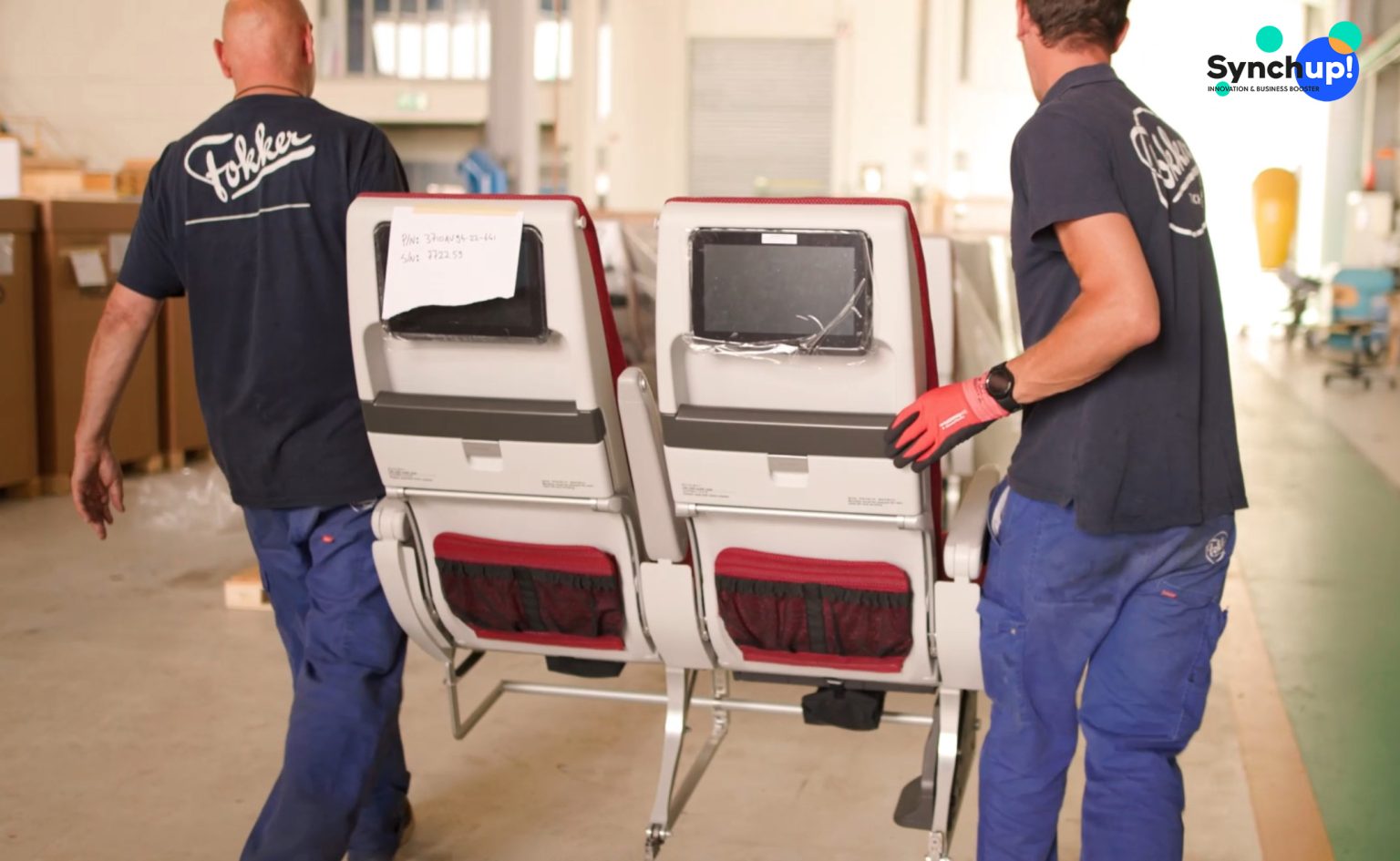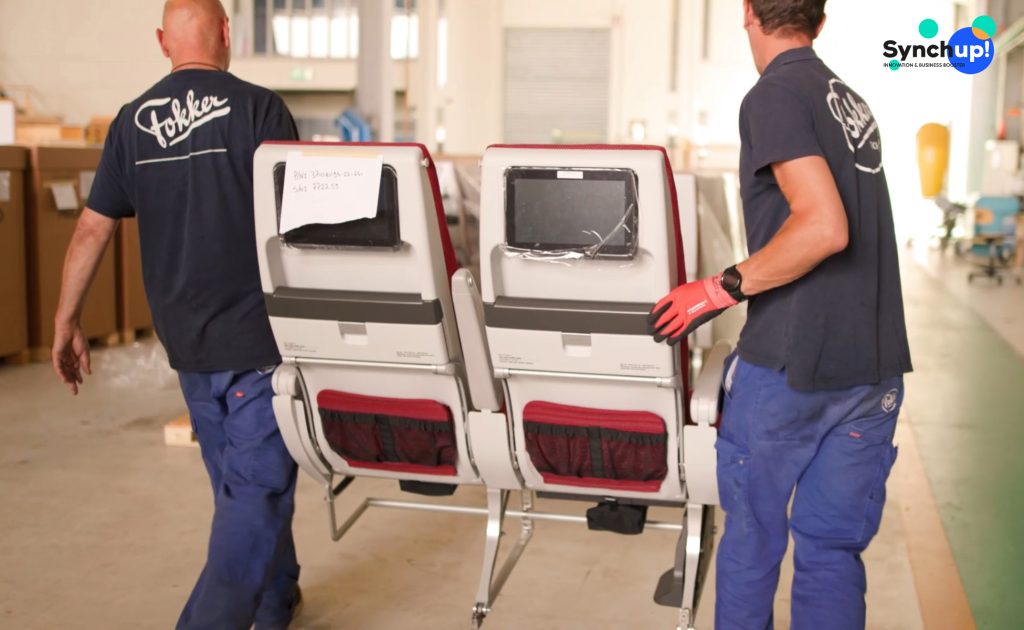“The whole process ran so professionally and went so well for us that we have now opened a second challenge.”
Before Fokker Services Woensdrecht can perform major maintenance on an aircraft, mechanics must first dismantle and remove the seats from the aircraft. A manual, time-consuming and risky process for which the company had been looking for a solution for some time. Thanks to the SynchUp! incentive programme, that solution is now coming into view.
Aircraft seats are tied together in pairs or threes. Removing those sets through an aircraft door to the hangar floor is now done using a forklift truck with a platform on top. Labour-intensive and not without safety risk. “That’s why we want to get rid of that. We have also tested various possible solutions, but without the desired result,” explains Edwin Poldermans of Fokker.
Out of routine
At Aviolanda Woensdrecht, Fokker Services Group is engaged in aircraft maintenance and repair and conversion of aircraft into VIP and Special Mission aircraft. Apart from disposing of the dismantled seats, their interim storage is also a challenge, as space in the hangar is limited. Bringing the seats back after maintenance work is completed presents the same problem as removal. Poldermans: “The problem with these kinds of issues is that you get stuck in your own prior knowledge and assumptions. The approach of SynchUp! took us out of our routine.”
SynchUp! accelerates innovation
REWIN West Brabant’s SynchUp! programme stimulates and accelerates innovation and business activity by putting so-called challenges ‘on the market’. A challenge is an issue raised by a large company to which SMEs and startups can respond with their offer. Challenge manager Freek van den Heuvel: “After the question has been identified, our scouts approach possible solution providers. We then intensively support the company with the best idea and the challenger in drawing up a project plan and innovation contract. This is how we maximise the chances of success. With an innovation voucher, we provide financial support to kick-start the project with a pilot and develop concrete solutions together.” The Fokker challenge was made possible thanks to contributions from Aviolanda, North Brabant province, RWB’s regional R&D subsidy fund, REWIN West-Brabant and World Class Maintenance (WCM).
Bringing neighbours together
Jacob Derks of WCM, on behalf of SynchUp! assisted Fokker Techniek in formulating the challenge. Four parties then responded to the challenge on the online SynchUp! platform. Derks: “We held in-depth discussions with the two best providers and visited the hangar. From that, Overveld Machines emerged as the best option.” Overveld Machines specialises in devising and building custom-made machines for specific applications. Richard Beismann of Overveld says: “I am in regular contact with REWIN. We know about each other what we do and can do. When the challenge was open, REWIN pointed me to it as they thought we would be able to develop a suitable solution. And they were right: these kinds of issues are right up our alley.” Beismann agrees that it “might seem a bit odd” that a programme like SynchUp! should bring two neighbours together. Beismann: “At the same time, this unambiguously proves the usefulness of the programme.” Poldermans concurs: “We did not know Overveld Machines sufficiently well and did not know that they can devise and build this kind of solution.”
Pilot phase
Once Overveld Machines’ idea was chosen, the specifications were further explored in a number of sessions and the project plan and innovation contract were drawn up. Overveld Machines initially came up with a fully automatic solution for transport from the aircraft door to the storage location in the hangar, says Derks. By mutual agreement that solution was ‘simplified’ so that a pilot became possible. Derks: “In the pilot phase, we will limit ourselves to developing a lift system with a working platform and with mobile carriers into which the mechanics can place the chair sets.” If the pilot succeeds, Overveld Machines will develop a storage system in a follow-up phase. A plan for this is already in place. The partners also want to realise a transport system from the ground floor to the storage system and vice versa.
Simple but good
Fokker’s request was challenging, says Beismann: “The lift must be able to stop at different heights. The undercarriage must be sufficiently flexible to be manoeuvrable. It is important to prevent the system from damaging the aircraft and there must be no impact load on the aircraft floor.” Poldermans: “Overveld Machines’ idea is simple, but good. The lift allows seat sets to be lowered quickly, easily and safely and later raised again. It saves considerable time, and time is money.”
Huge potential
Beismann is “more than happy” with the support from the SynchUp! team. “Guiding the discussions, drafting the innovation contract and the project plan; it all went very smoothly.” On 1 June, the machine builder received a SynchUp!-innovation voucher worth 10,000 euros. “A nice kick-start to the development. Fokker is also investing a serious amount to make the pilot possible. The entire aircraft maintenance industry is struggling with this issue, so the potential for our company is huge.”
Poldermans: “The whole process was so professional and went so well for us that we have now issued a second challenge.” There is another important side effect of the SynchUp! challenge, he continues. “It gives our company more exposure in the region. Potential employees and suppliers know how to find us more easily as a result. We like to be known as an innovative and growing company. SynchUp! fits into that image.”





